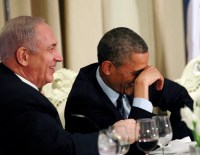U.S. President Barack Obama at the Jerusalem Convention Center on March 21, 2013
From almost the moment President Obama touched down at Ben Gurion International Airport, he began to push Israeli Prime Minister Benjamin Netanyahu to make up with Turkey. The previously good relations broke down in 2010 after the Israelis raided a Turkish flotilla taking aid to the Gaza Strip. Nine activists were killed.
Since then, the U.S. has pushed Israel and Turkey — both close allies — to work through their issues. Officials at meetings at nearly every level from the President down brought up rapprochement. Secretary of State John Kerry pressed Turkish Prime Minister Recep Tayyip Erdogan on Israel on March 1 on a trip to Ankara.
By day two of Obama’s visit, Netanyahu had agreed to set up a call with Erdogan. Given the two leaders’ busy schedules, it was not until just as Obama and Netanyahu were arriving back at the airport for the President’s departure to Jordan a day later that a call was possible. Obama and Netanyahu ducked into a trailer off of the red carpet set up for the departure ceremony.
For nearly half an hour, Netanyahu and Erdogan spoke through translators. Obama briefly got on the phone to say hello to Erdogan and ask that they follow up with another call soon. Netanyahu offered Turkey an official apology for the flotilla incident and promised compensation to the victims’ families. He said a subsequent Israeli investigation into the incident revealed “several operational errors,” according a statement released by the Israeli embassy in Washington.
Netanyahu also thanked Erdogan for his remarks condemning anti-Semitism to a Danish paper on March 20. Erdogan had been quoted last month calling Zionism “a crime against humanity,” and he told the Danish paper those remarks had been misinterpreted. During his Ankara visit, Kerry had condemned Erdogan’s statement on Zionism, urging the Turkish Prime Minister both publicly and privately to clarify them.
The deal was a coup for Obama, on his first foreign visit of his second term. It re-established diplomatic relations between Israel and Turkey at a time when the region around them is in turmoil. Both Turkey and Israel border Syria, which is entering its third year of civil war. “We have regretted for a couple of years now the absence of normal relations between those two countries,” a senior Administration official told reporters on Air Force One en route to Jordan. “And we have worked with them and urged them both to reach out and try to put their differences between them.”
Netanyahu on Saturday said the deteriorating situation in Syria and both countries’ concerns about its regime’s chemical and biological weapons prompted the reconciliation. Still, Erdogan warned on Sunday that normalization of relations would not be immediate. Turkey will wait for Israel to pay the families compensation before embassies in either country reopen. Netanyahu told Erdogan that Obama had spent the past two days convincing him of “the importance of regional relations, the importance of Turkey-Israel cooperation, and that is what led him to take this initiative now,” the Administration official said. Up until the flotilla incident, Turkey and Israel had enjoyed close relations. Turkey was the first Muslim country to recognize Israel, though tensions began to fray in 2003 after Erdogan, who has Islamist ties, was elected Prime Minister of Turkey.


